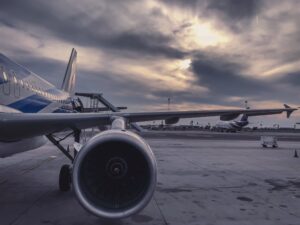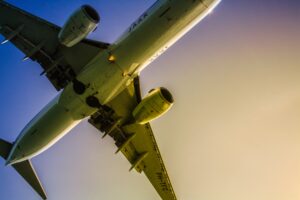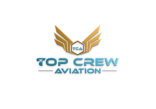The DGCA (Directorate General of Civil Aviation) CPL Ground Class (Commercial Pilot License) syllabus for Technical General is a comprehensive guide that outlines the topics that aspiring pilots need to study to pass the written exam on this subject. This syllabus is designed to provide a thorough understanding of the technical aspects of aircraft and aviation systems, ensuring that pilots can operate aircraft safely and efficiently. Here is a detailed overview of the DGCA CPL syllabus for Technical General.
-
Aircraft General: This section covers the general principles of aircraft design, construction, and maintenance. Pilots must understand the different components of aircraft and their functions, including the airframe, powerplant, and systems.
-
Flight Instruments: This section covers the different types of flight instruments used in aircraft, including basic instruments, gyroscopic instruments, and electronic instruments. Pilots must understand how to interpret and use these instruments to fly an aircraft safely and efficiently.
-
Powerplant: This section covers the principles of aircraft engines and their components. Pilots must understand the different types of engines used in aircraft, including reciprocating and turbine engines, and how they operate.
-
Propellers: This section covers the principles of aircraft propellers and their components. Pilots must understand the different types of propellers used in aircraft, including fixed-pitch and variable-pitch propellers, and how they operate.
-
Fuel Systems: This section covers the principles of aircraft fuel systems and their components. Pilots must understand how fuel is stored, transferred, and used in aircraft, including fuel tanks, pumps, and filters.
-
Lubrication Systems: This section covers the principles of aircraft lubrication systems and their components. Pilots must understand how lubrication is used to reduce friction and wear in aircraft engines and how these systems are maintained.
-
Hydraulic Systems: This section covers the principles of aircraft hydraulic systems and their components. Pilots must understand how hydraulic systems are used to operate aircraft controls and landing gear and how these systems are maintained.
-
Electrical Systems: This section covers the principles of aircraft electrical systems and their components. Pilots must understand how electrical systems are used to power aircraft instruments, lighting, and other equipment, and how these systems are maintained.
-
Environmental Systems: This section covers the principles of aircraft environmental systems and their components. Pilots must understand how these systems are used to regulate temperature, pressure, and ventilation in the aircraft cabin, and how they are maintained.
-
Aircraft Performance: This section covers the principles of aircraft performance and how it is measured. Pilots must understand how to calculate aircraft performance parameters, including takeoff and landing distances, climb and descent rates, and fuel consumption.
-
Weight and Balance: This section covers the principles of aircraft weight and balance and how it is calculated. Pilots must understand how to determine the weight and balance of an aircraft to ensure that it is loaded correctly for safe and efficient operation.
-
Maintenance Practices: This section covers the principles of aircraft maintenance and how it is conducted. Pilots must understand the different types of maintenance, including routine inspections, repairs, and overhauls, and how to ensure that maintenance is conducted to maintain the aircraft’s safety and airworthiness.

In conclusion, the DGCA CPL syllabus for Technical General covers a wide range of topics related to the technical aspects of aircraft and aviation systems. By mastering these topics, aspiring pilots can enhance their knowledge and skills, ensuring safe and efficient flight operations. The syllabus covers the general principles of aircraft design, construction, and maintenance, as well as specific systems such as flight instruments, powerplant, fuel systems, lubrication systems, hydraulic systems, electrical systems, environmental systems, aircraft performance, weight and balance, and maintenance practices. By studying these topics, pilots can ensure that they have the all knowledge about the aircraft.
DGCA Syllabus of Technical General
The DGCA (Directorate General of Civil Aviation) CPL (Commercial Pilot License) syllabus for Technical General is designed to cover a range of technical topics related to aircraft and aviation systems. Here is a detailed overview of the syllabus:
-
Aircraft General: This section covers the fundamental principles of aircraft design, construction, and maintenance. It includes topics such as aircraft types and configurations, materials used in aircraft construction, aircraft structural components, and their functions, and aircraft maintenance procedures.
-
Flight Instruments: This section covers the different types of flight instruments used in aircraft, including basic instruments, gyroscopic instruments, and electronic instruments. It includes topics such as the principles of instrument operation, instrument errors and corrections, and instrument reading and interpretation.
-
Powerplant: This section covers the principles of aircraft engines and their components. It includes topics such as engine types and configurations, engine cycles and operation, engine components and systems, and engine maintenance procedures.
-
Propellers: This section covers the principles of aircraft propellers and their components. It includes topics such as propeller types and configurations, propeller operation and performance, propeller components and systems, and propeller maintenance procedures.
-
Fuel Systems: This section covers the principles of aircraft fuel systems and their components. It includes topics such as fuel types and properties, fuel storage and distribution, fuel system components and operation, and fuel system maintenance procedures.
-
Lubrication Systems: This section covers the principles of aircraft lubrication systems and their components. It includes topics such as lubrication types and properties, lubrication system components and operation, and lubrication system maintenance procedures.
-
Hydraulic Systems: This section covers the principles of aircraft hydraulic systems and their components. It includes topics such as hydraulic system types and configurations, hydraulic system components and operation, and hydraulic system maintenance procedures.
-
Electrical Systems: This section covers the principles of aircraft electrical systems and their components. It includes topics such as electrical system types and configurations, electrical system components and operation, and electrical system maintenance procedures.
-
Environmental Systems: This section covers the principles of aircraft environmental systems and their components. It includes topics such as environmental system types and configurations, environmental system components and operation, and environmental system maintenance procedures.
-
Aircraft Performance: This section covers the principles of aircraft performance and how it is measured. It includes topics such as aircraft performance parameters, such as takeoff and landing distances, climb and descent rates, and fuel consumption, and the factors that affect aircraft performance.
-
Weight and Balance: This section covers the principles of aircraft weight and balance and how it is calculated. It includes topics such as aircraft loading and distribution, center of gravity calculations, and weight and balance maintenance procedures.
-
Maintenance Practices: This section covers the principles of aircraft maintenance and how it is conducted. It includes topics such as maintenance types and classifications, maintenance procedures and documentation, and the importance of maintenance in ensuring safe and efficient flight operations.
In conclusion, the DGCA CPL syllabus for Technical General covers a wide range of technical topics related to aircraft and aviation systems. By studying these topics, aspiring pilots can gain a comprehensive understanding of the technical aspects of aviation, enhancing their knowledge and skills, and ensuring safe and efficient flight operations. The syllabus includes a broad range of topics, including aircraft design, construction, and maintenance, flight instruments, powerplant and propeller systems, fuel and lubrication systems, hydraulic and electrical systems, environmental systems, aircraft performance, weight and balance, and maintenance practices.

Why Choose Top Crew Aviation for Technical General
-
- We do not teach only to clear your exam we teach the way so that you can teach others
- Concepts are explained in detail.
- The best level of training with professional & personal attention to each student.
- Proven course structure & strategy to pass DGCA examinations.
- Daily topic-wise test.
- Offline/Online DGCA Ground Classes (Classes at the comfort of your own home)
- Student progress monitoring and support.
- Daily homework for practice.
- Sample question papers will be provided along with notes.
- Concentration enhancement tips to optimize student performance.
- Most of the Instructors are Airline captains who share their past events and & experiences.
- All study materials & notes are provided with enrolment. (CX-3 & scientific calculator excluded)
- We try to explain with a Pictorial presentation for better understanding and memory-aiding concepts.
What Top Crew Aviation provides in Technical General
-
- Top Crew Aviation is an outstanding airline training institution for those looking to commence a career in aviation. A high standard of training is provided by exceptional instructors who guide you through all stages of the course in the classroom.
- Our aim is to clear your DGCA exams in the very first attempt through India’s best DGCA Ground Classes.
- Our highly trained and committed staff ensures that the environment and content of our courses exceed the expectations of our students, whether you are an airline cadet or a CPL holder student we have the course for you.
- The perfect launchpad course made by Capt. P KUMAR, who has 15 years of rich experience in aviation.
- Best results and 100% student satisfaction.
- Specially designed best CPL Ground Classes in the best possible small batches for candidates without flying experience.
- The best training is provided by an industry expert trainer who has more than 10 plus years of rich experience in his field.
- Our prime responsibility is to create a vibrant community around you, so we want you to enjoy your time at the Academy and make the most of every minute.
- Our trainers do not only focus on knowledge but also on building the skills, and attitude of the students including all phases of the ground training as a strategy to fulfill their dreams as airline Pilots.
- We offer Commercial Pilot Training preparation courses for CPL, ATPL, and RTR. Our motive is not just to provide ground training to the candidates but also to create well-trained pilots.
- TCA Academy is committed to providing world-class training facilities for future commercial pilots. It is being one of the best Pilot Training Institutes in India, to provide DGCA ground classes in the best possible small batches so that each student receives proper attention.
- Capt. P KUMAR mentors all candidates personally and tries to offer the best solution to make them master all skills to succeed in this field of aviation and to ensure that each and every goal is achieved.
